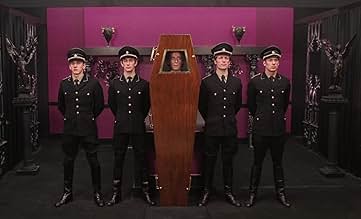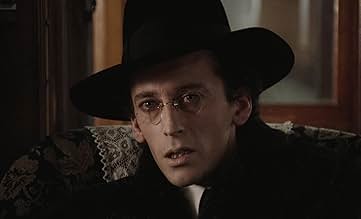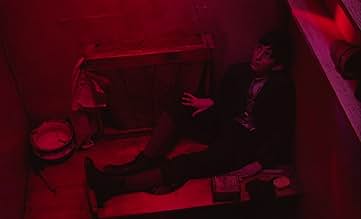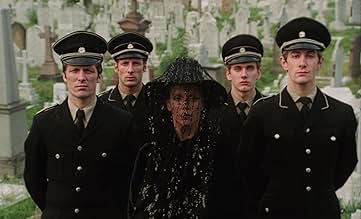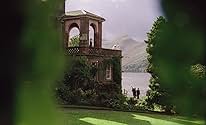IMDb-BEWERTUNG
7,0/10
3307
IHRE BEWERTUNG
Füge eine Handlung in deiner Sprache hinzuComposer Gustav Mahler's (Robert Powell) life, told in a series of flashbacks as he and his wife (Georgina Hale) discuss their failing marriage during a train journey.Composer Gustav Mahler's (Robert Powell) life, told in a series of flashbacks as he and his wife (Georgina Hale) discuss their failing marriage during a train journey.Composer Gustav Mahler's (Robert Powell) life, told in a series of flashbacks as he and his wife (Georgina Hale) discuss their failing marriage during a train journey.
- 1 BAFTA Award gewonnen
- 3 Gewinne & 1 Nominierung insgesamt
Empfohlene Bewertungen
If you are in the camp of liking Ken Russell, you are going to love this movie. If you like Mahler's compositions and think you're going to get a straightforward biopic (more on this later), you're in the wrong place.
This film is beautifully shot, the acting is over the top in many cases, the imagery will at times be disturbing, the metaphors will run deep, like all Russell's movies.
I just heard of Georgina Hale's passing in January of this year (2024) so was drawn to watch this film again because she was fantastic. I know she won a BAFTA for it, but she should have been given more recognition outside of the UK for this role.
I want to return to the term "straightforward biopic" now. By that I mean the cookie cutter, sanitized tripe that moviegoers normally eat up like Bohemian Rhapsody, Rocket Man, A Beautiful Mind, etc., that take real people who had very interesting lives and then manipulate, fabricate, and distort to give us our feels but no substance. You're better off just watching a documentary in most cases.
If you're going to do a biopic, I say go all in like Ken Russell does. While you may get his version of the story, at least you're going to be in for a beautiful and wild ride that will also make you think.
This film is beautifully shot, the acting is over the top in many cases, the imagery will at times be disturbing, the metaphors will run deep, like all Russell's movies.
I just heard of Georgina Hale's passing in January of this year (2024) so was drawn to watch this film again because she was fantastic. I know she won a BAFTA for it, but she should have been given more recognition outside of the UK for this role.
I want to return to the term "straightforward biopic" now. By that I mean the cookie cutter, sanitized tripe that moviegoers normally eat up like Bohemian Rhapsody, Rocket Man, A Beautiful Mind, etc., that take real people who had very interesting lives and then manipulate, fabricate, and distort to give us our feels but no substance. You're better off just watching a documentary in most cases.
If you're going to do a biopic, I say go all in like Ken Russell does. While you may get his version of the story, at least you're going to be in for a beautiful and wild ride that will also make you think.
This movie, while beautifully shot, grows completely out of control as is moves along. The once over of Gustav Mahler by Ken Russell falls into the trap that all the other Russell films do--over excess. The shot of Mahler biting into a pig snout is one of the most disgusting and offensive images I have ever seen.
Like Tchaicovksy before him composer Gustav Mahler gets cuffed about in grand fashion in this bio on his life by Ken Russell. Russell as usual pulls no punches while landing some low blows in this brilliantly sardonic take on the composer conductor's life and career.
Gustav Mahler ( Robert Powell ) ill but unaware he' ll be dead within a year rides exhausted aboard a train across the Eurpeon landscape with his wife whose looking to get off at the next stop with a lover. In the depths of despair he reflects upon his past; a brutal father, a brothers suicide, a death of a child infidelity , religious conversion to attain status as well as the immediate problem of holding onto his wife.
Such downward spiral tragedy is prime Bergman territory but in the hands of Infant Terrible Russell it is a wild, irreverent , dark humored ride down the tracks accompanied by the composers magnificent writings both skillfully and comically matched to imagery and situation. Cosima Wagner as a Brunhilde Nazi, the impoverished siblings as the Marx Brothers, the sacrilegious conversion rite intermixed with scenes of pastoral beauty that inspired him unfold at a rapid and provocative tempo.
Powell is a dead ringer for the composer and he does a commendable job of conveying his ego, cynicism and vulnerability huddled in his exclusive passenger car. It is Russell's jaundice and vivid interpretation though that will leave the viewer mesmerized or revolted. With Ken's films there is no in between.
Gustav Mahler ( Robert Powell ) ill but unaware he' ll be dead within a year rides exhausted aboard a train across the Eurpeon landscape with his wife whose looking to get off at the next stop with a lover. In the depths of despair he reflects upon his past; a brutal father, a brothers suicide, a death of a child infidelity , religious conversion to attain status as well as the immediate problem of holding onto his wife.
Such downward spiral tragedy is prime Bergman territory but in the hands of Infant Terrible Russell it is a wild, irreverent , dark humored ride down the tracks accompanied by the composers magnificent writings both skillfully and comically matched to imagery and situation. Cosima Wagner as a Brunhilde Nazi, the impoverished siblings as the Marx Brothers, the sacrilegious conversion rite intermixed with scenes of pastoral beauty that inspired him unfold at a rapid and provocative tempo.
Powell is a dead ringer for the composer and he does a commendable job of conveying his ego, cynicism and vulnerability huddled in his exclusive passenger car. It is Russell's jaundice and vivid interpretation though that will leave the viewer mesmerized or revolted. With Ken's films there is no in between.
Yes, you had to have developed an appetite for Ken Russell's visions. Mahler works beautifully for me. I happen to like Mahler's music and historically, Russell, captures the juice of this man's genius.
Russell moves behind the music, into the skin of Mahler, his wife, Alma, and the tragic circumstances that surround them.
Mahler would have smiled when experiencing Russell's image of him. Thomas Mann's book, Death in Venice, is about Mahler, and Russell includes the railroad station scene, with the young boy and the business man, courting a bit, and then the camera, goes to Mahler, who understands whats going on here, and smiles, in amusement. Clever touch for Russell, but is most likely lost on the general audience. Not to say Mahler liked little boys, but his sexual orientation was ambiguous, at best.
Alma was like that, and the officer, whom she was having an affair, was most likely that way? Mahler went to see Freud over this affair in reality. Russell always takes us inside the psychological drama and visualizes, the inner Hell, Mahler feared regarding his wife and his coming death.
Alma had affairs after Mahler's death, and was a star f...ER, and had marriages and affairs with Europe's most brilliant geniuses, for real. She loved bright men, but loved herself, the most, I think? Later Erich Wolfgang Korngold, wrote a violin concerto for her, in Hollywood.
The film's tracking of the creative process regarding the music, is most likely right on, though the little composing hut, was not on the lake shore, but on a hill top, overlooking the lake.
Over all the film is historically correct, and emotionally, shows it as it most likely was for them as a famous couple. Alma did harbor jealousy, and stopped composing her music. Of late a CD has been released of her music and her music is acceptable, but pales compared to her husband's giant compositions.
I would have liked for Russell to include Richard Strauss's music, and their personal friendship. Both composers often talked about their troubles with their music and their wives. Strauss and Mahler are often similar in their musical genius, and understood each other's vision musically. It would have been nice to have the two together more in this film's history.
You have to have a taste for Mahler and Russell, to really get the humor and the brilliance that lies just beneath of surface. At least, Mahler, did not turn out to be another TOMMY...ha Bravo to Ken Russell and I am so glad he came along in my life time. Cast was perfect as well.
Russell moves behind the music, into the skin of Mahler, his wife, Alma, and the tragic circumstances that surround them.
Mahler would have smiled when experiencing Russell's image of him. Thomas Mann's book, Death in Venice, is about Mahler, and Russell includes the railroad station scene, with the young boy and the business man, courting a bit, and then the camera, goes to Mahler, who understands whats going on here, and smiles, in amusement. Clever touch for Russell, but is most likely lost on the general audience. Not to say Mahler liked little boys, but his sexual orientation was ambiguous, at best.
Alma was like that, and the officer, whom she was having an affair, was most likely that way? Mahler went to see Freud over this affair in reality. Russell always takes us inside the psychological drama and visualizes, the inner Hell, Mahler feared regarding his wife and his coming death.
Alma had affairs after Mahler's death, and was a star f...ER, and had marriages and affairs with Europe's most brilliant geniuses, for real. She loved bright men, but loved herself, the most, I think? Later Erich Wolfgang Korngold, wrote a violin concerto for her, in Hollywood.
The film's tracking of the creative process regarding the music, is most likely right on, though the little composing hut, was not on the lake shore, but on a hill top, overlooking the lake.
Over all the film is historically correct, and emotionally, shows it as it most likely was for them as a famous couple. Alma did harbor jealousy, and stopped composing her music. Of late a CD has been released of her music and her music is acceptable, but pales compared to her husband's giant compositions.
I would have liked for Russell to include Richard Strauss's music, and their personal friendship. Both composers often talked about their troubles with their music and their wives. Strauss and Mahler are often similar in their musical genius, and understood each other's vision musically. It would have been nice to have the two together more in this film's history.
You have to have a taste for Mahler and Russell, to really get the humor and the brilliance that lies just beneath of surface. At least, Mahler, did not turn out to be another TOMMY...ha Bravo to Ken Russell and I am so glad he came along in my life time. Cast was perfect as well.
Mahler is an interesting case. Whereas Ken Russell's films are either just over the top (his theatrical films), or maybe even too subtle (his television work), Mahler is both. Its closest companion may be always the simple but exquisite Song of Summer, but there is that usual kitsch and excess you can find without a magnifier from Lisztomania and other Russell classics.
What I'm trying to say is that if you find Russell's television work too tame, and The Devils and Tommy are just too much, Mahler might be your film. It's not Russell's best, but in this film he found a balance which is rare to him. It may be a slow and long film, but in the end game is wonderfully rich and profound in explaining the essence of artistry and creativity. And much like Michael Powell did to ballet dance in The Red Shoes, Russell doesn't just explain his subject matter in Mahler: he brings it alive. It's like the romantic Gustav Mahler himself made this film.
And, of course, there is the music! Much recommended to everybody.
What I'm trying to say is that if you find Russell's television work too tame, and The Devils and Tommy are just too much, Mahler might be your film. It's not Russell's best, but in this film he found a balance which is rare to him. It may be a slow and long film, but in the end game is wonderfully rich and profound in explaining the essence of artistry and creativity. And much like Michael Powell did to ballet dance in The Red Shoes, Russell doesn't just explain his subject matter in Mahler: he brings it alive. It's like the romantic Gustav Mahler himself made this film.
And, of course, there is the music! Much recommended to everybody.
Wusstest du schon
- WissenswertesKen Russell was inspired to make his film about composer Gustav Mahler after greatly disliking Der Tod in Venedig (1971). In a segment of his autobiography about this film, Russell said that he thought that the other "so-called Mahler film," "Death in Venice," was rubbish. "People think it's about Mahler, all because his music is part of the soundtrack! The director, Luchino Visconti, never said it was about him, though." So he mocked the film in his movie. He had a satirical moment when Mahler looks out of the train and sees his dying lookalike. In Visconti's movie, the young actor playing Tadzio was 15, but in this film, as in Thomas Mann's book, the boy being ogled is only a child.
- PatzerWhen Mahler's train leaves St. Pölten, a sign is visible identifying the town as "Saint Pölten". Yet, the German long script for the town is "Sankt Pölten".
- Zitate
[last lines]
Gustav Mahler: [reminded of some medications he should take] They won't be needed! We're going to live forever!
- VerbindungenFeatured in A British Picture (1989)
- SoundtracksIn Stormy Weather
Sung by Carol Mudie
Performed by The National Philharmonia Orchestra
Conducted by John Forsyth
Top-Auswahl
Melde dich zum Bewerten an und greife auf die Watchlist für personalisierte Empfehlungen zu.
- How long is Mahler?Powered by Alexa
Details
- Erscheinungsdatum
- Herkunftsland
- Sprachen
- Auch bekannt als
- Mahler, una sombra en el pasado
- Drehorte
- Produktionsfirmen
- Weitere beteiligte Unternehmen bei IMDbPro anzeigen
Zu dieser Seite beitragen
Bearbeitung vorschlagen oder fehlenden Inhalt hinzufügen


